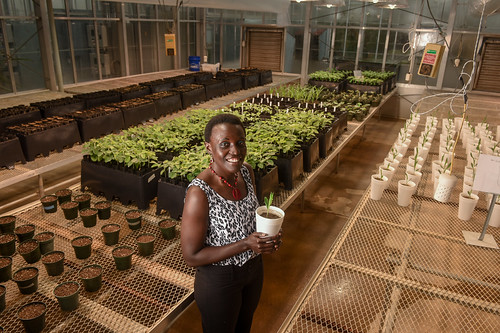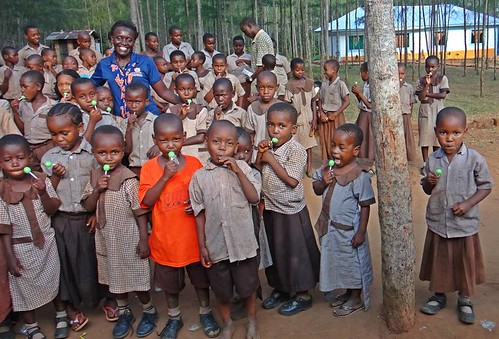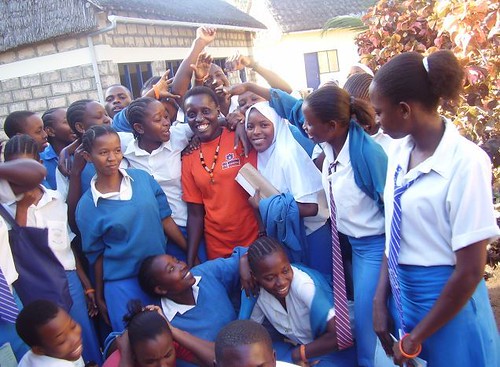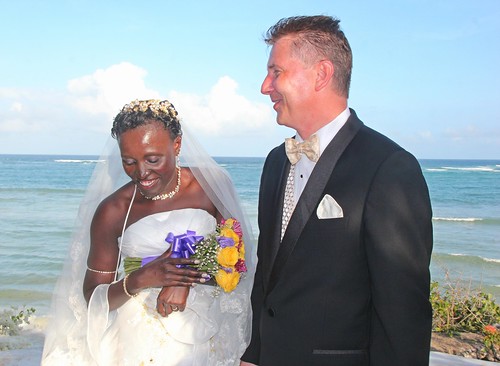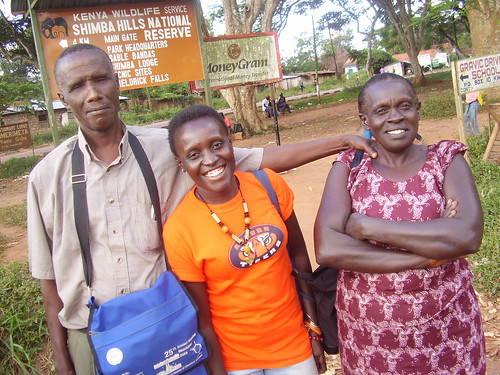Auburn researcher Esther Ngumbi turning dreams into realities with a passion for giving back to her native village in Kenya
Article body
Here's how dictionaries tend to define a dreamer: one who lives in a world of fantasy; one who is impractical and unrealistic; a person whose ideas or projects are considered audacious or highly speculative; someone guided more by ideals than by practical considerations.
In the case of Esther Ngumbi, those definitions are wrong, wrong, wrong, wrong.
True, Ngumbi can have some mighty wild dreams, but she also has a remarkable track record of turning the most seemingly far-fetched visions into realities. Especially in Mabafweni, the impoverished village in Kwale County, Kenya, where she was born and raised.
Going home
Here's a for instance. Last fall, Ngumbi, a 2011 Auburn University doctoral alumnus in entomology who now is a postdoctoral plant pathology researcher in the College of Agriculture, made the 8,400-mile journey back to her native village for two glorious events. The first of those was the grand-opening celebration of Mabafweni's first-ever library—a prime example of an Ngumbi dream coming true.
"There was a great need for a library, an essential space where students and all members of the community could gather to explore, interact, imagine and quench their thirst for knowledge," she said. "Through books, I want people, especially young Kenyan students, to be inspired to reach for the stars."
In a village of 22,000 people whose average income is $3 a day, having a library is a big deal, as was evidenced by the mass turnout for the ribbon-cutting ceremony.
"There was a huge crowd, an incredible crowd, of happy students, parents and community members," Ngumbi said. "The excitement level of having a library facility was high, way-up-over-the-roof high."
The library exists because, as Ngumbi readily admits, she has a tough time keeping her dreams to herself.
"When I have a dream, I can't stop talking about it," Ngumbi says. "Everybody knows what I want to do."
And in the library's case, sharing her vision paid off, in the form of an unexpected $10,000 grant from the nonprofit group 101 Heroes. That gift, combined with other donations of money and materials, covered construction costs for the 1,100-square-foot, cement-block library in Mabafweni. As for the 2,000-plus books and textbooks on the shelves when it opened, Ngumbi went department to department and organization to organization on the Auburn campus to round those up.
Cultivating young minds
The library, incidentally, is part of Faulu Academy, a primary school that was—what?—another of Ngumbi's dreams. That one began at Auburn's August 2011 commencement ceremony, during which Ngumbi became the first—and only—individual from her community to be awarded a doctorate degree.
"The day I received my Ph.D. at Auburn, I started thinking of the many children in my community who had the potential to be scientists like me but lacked the opportunity," she said. "I told myself then I would do whatever it takes to give these children opportunities to break the poverty barrier by getting an education and developing their potential to the fullest."
In 2012, she and her parents, both retired schoolteachers, opened Faulu Academy in a mud hut with 10 students. Today, Faulu—which means "success" in Swahili—has a blocks-and-mortar building and 94 students in grades one through six. Grades seven and eight will be added in the next couple of years.
Unlike the library, Faulu is not Mabafweni's only school.
"There are other public schools in the area," Ngumbi said, "but we started Faulu Academy because we wanted to give students the very best there can be."
So, now that she's realized her dreams for an excellent primary school in her village and a library that serves the entire community, what's next? A science lab, of course.
Which brings us to the second major event that drew Ngumbi home: her wedding, one dream the 38-year-old had never allowed herself to have.
But less than a week after the colossal community-wide celebration of the new library, in a small outdoor ceremony at the Swahili Beach Hotel on the Kenyan Coast, she married long-time significant other Alex Mutiso, a graphic designer from Atlanta. Her parents, Harrison and Bertha, walked her down the aisle.
"It was a magical day, every second of it, the wedding and the reception," Ngumbi said. "We started around 3 p.m. and did not end until the wee hours of the morning. We did not want it stop."
A bride's bucket list
But what does Ngumbi's wedding have to do with a science laboratory? Well, when the two got engaged in summer 2015, they quickly posted their bridal registry online. It consisted of a single request of friends and other well-wishers: In lieu of wedding presents, please help us build a science lab in Mabafweni "so as to inspire a generation of scientists."
The registry, titled "a to-be bride's bucket list," was housed on the popular crowdfunding site FundProVo. Within days of the site's launching, the uplifting story of the couple's alternative wedding registry had gone viral. A feature in a popular international fashion magazine for women—OK, it was Cosmopolitan—carried the subhead, "This woman's wedding registry will inspire you to be a better person."
While the unusual registry generated a great deal of publicity, the exposure didn't translate into mass contributions. Donations totaled $3,320, far short of the $10,000 goal, and the fundraising effort officially ended April 30. That will not mean death to Ngumbi's latest dream, however. Make no mistake, the science lab will happen. It's too important not to.
"The lack of science laboratories robs our students of the opportunity to discover how exciting science can be," she said. "The lab will allow our young students to experience the magic of science and develop an interest in it so that I will not be the only Ph.D. in my village. There will be many more."
Related Media
Related Links
Media interested in this story can contact Communications Director Preston Sparks at (334) 844-9999 or preston.sparks@auburn.edu.
Auburn University is a nationally ranked land grant institution recognized for its commitment to world-class scholarship, interdisciplinary research with an elite, top-tier Carnegie R1 classification, life-changing outreach with Carnegie’s Community Engagement designation and an undergraduate education experience second to none. Auburn is home to more than 30,000 students, and its faculty and research partners collaborate to develop and deliver meaningful scholarship, science and technology-based advancements that meet pressing regional, national and global needs. Auburn’s commitment to active student engagement, professional success and public/private partnership drives a growing reputation for outreach and extension that delivers broad economic, health and societal impact.



